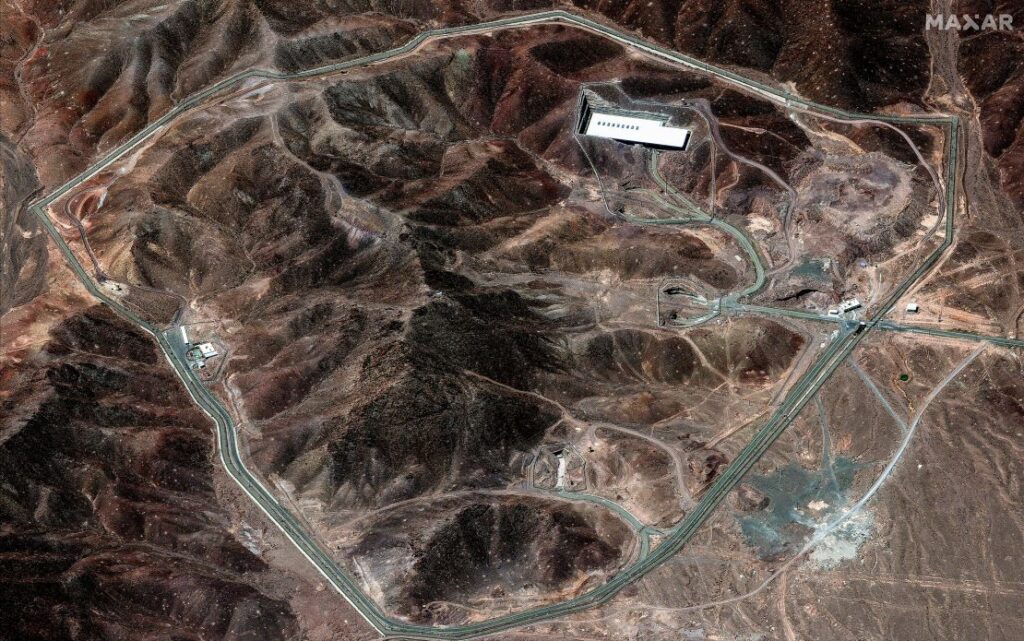As Israel wages its most aggressive and far-reaching military campaign against Iran’s nuclear infrastructure, attention is increasingly focused on one site: the Fordow uranium enrichment facility, a heavily fortified installation buried deep within a mountain in northern Iran. Military and intelligence officials warn that the success — or failure — of the Israeli operation may ultimately hinge on Fordow’s fate.
Fordow, long regarded as Iran’s most invulnerable nuclear site, remains mostly untouched as of Sunday, despite widespread strikes on other critical infrastructure. That includes the destruction of above-ground facilities in Natanz and Esfahan and the assassination of several senior nuclear scientists.
“The entire operation… really has to be completed with the elimination of Fordow,” said Israeli Ambassador to the U.S. Yechiel Leiter in an interview with Fox News.
Without neutralizing Fordow, experts say, Israel risks allowing Iran to preserve the core of its nuclear capabilities — and possibly even accelerate its weapons program in response.
Fordow was constructed with one purpose: survival. Designed to withstand even the most powerful conventional strikes, the facility is embedded into a mountainside and protected by layers of reinforced rock and steel. Israel simply does not possess the kind of heavy-duty bunker-busting munitions or strategic bombers capable of penetrating the site. But the U.S. does.
That’s why Israeli leaders have signaled that American involvement — or at the very least, American firepower — may be essential for completing the mission.
According to an Israeli official who spoke to Axios, President Donald Trump had suggested in a pre-strike conversation with Prime Minister Benjamin Netanyahu that the U.S. could assist if Fordow became a necessary target. However, a White House official flatly denied that claim, saying Trump conveyed the opposite: that the U.S. has no intention of participating directly in the Israeli campaign.
Lacking U.S. bunker-buster support, Israel may attempt to destroy Fordow using unconventional tactics. One possibility being considered, experts say, is repeatedly striking the same coordinates to simulate the effect of a single massive bomb.
Another, far riskier, option would involve special forces. Israel has a track record of high-risk raids on hardened targets. In September 2024, Israeli commandos successfully infiltrated and destroyed an underground missile factory in Syria by planting explosives inside the site.
“Replicating that success at Fordow would be exponentially harder,” said a former Israeli intelligence official. “It’s deeper, better defended, and more heavily surveilled. But it’s not impossible.”
Netanyahu has said the initial wave of strikes were a necessary preemptive action to halt Iran’s march toward a nuclear weapon. He pointed to intelligence indicating that Tehran had resumed weaponization research and continued to enrich uranium far beyond civilian-grade levels.
“Iran must not have a nuclear weapon,” Netanyahu declared Friday. “That has been the consistent message of President Trump, and we hope he will follow through on it.”
The International Atomic Energy Agency confirmed the destruction of Natanz’s above-ground enrichment facility and several sites in Esfahan, calling it a significant setback to Iran’s nuclear program. While the underground segment of Natanz appears physically intact, IAEA Director-General Rafael Grossi said that Israeli strikes had severed power to the compound, possibly damaging the centrifuge systems.
Grossi added that Iranian officials had informed him Fordow had also been attacked — though he said the IAEA had not yet confirmed that independently.
If Israel fails to eliminate Fordow, analysts say, it could face a worst-case scenario: an enraged and undeterred Iran accelerating its nuclear work in an indestructible facility. That could turn a bold operation into a strategic misfire, with far-reaching consequences.
“If Fordow survives, the heart of the program survives,” said one Western defense analyst. “And with the death of multiple scientists, Iran may become more committed than ever to finishing the work.”
As of Sunday, the IDF has not claimed responsibility for any attacks on Fordow, and satellite imagery has not shown signs of major damage.
Despite Israel’s appeals, the Trump administration continues to distance itself from the operation, at least publicly.
Netanyahu himself has left the door open for American involvement.
“I leave the U.S. position to the U.S.,” Netanyahu said. “What are they going to do now? That’s for President Trump to decide.”
(YWN World Headquarters – NYC)












4 Responses
Does it then seem like a futile effort if the main danger is still alive and well? Am I reading this wrongly?
israel bought a dozen 13-ton bunker buster bombs a few years ago. all they need now is to borrow a used b-52 for a few days…
There are reports coming In right now that Israel just stuck this site.
“All they need now is to borrow a used b-52 for a few days…”
Just a bit more complicated that “borrowing a used B-52…”. It won’t happen w/o active and direct U.S. participation on several levels and for now, Trump doesn’t want to involve the U.S. at that level. As with anything Trump, that could change in a nanosecond if he believes he has been slighted in any way or if domestic politics seem to support direct intervention.